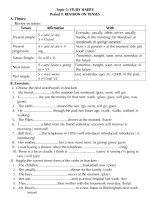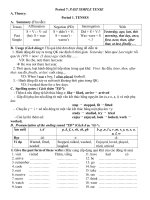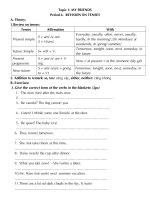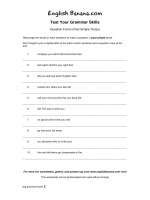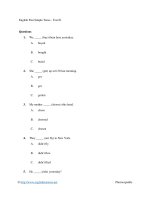TCHON Period 7 PAST SIMPLE TENSE.doc
Bạn đang xem bản rút gọn của tài liệu. Xem và tải ngay bản đầy đủ của tài liệu tại đây (147.82 KB, 6 trang )
Period 7: PAST SIMPLE TENSE
A. Theory:
Period 1. TENSES
A. Summary (Tóm tắt):
Tenses
Affirmation
(KĐ)
Negation (PĐ)
Interrogation
(NV)
With
Past
Simple
S + V
2
- V- ed
(be): S + was-
were
S + didn’t + V
1
S + wasn’t -
weren’t
Did + S + V
1
?
Was- were + S
+..?
Yesterday, ago, last, this
morning, that day, once,
first, next, then, after
that, at last, finally …
B. Usage (Cách dùng): Thì quá khứ đơn được dùng để diễn tả:
1. Hành động đã xảy ra trong QK xác định rõ thời gian: Yesterday: hôm qua/ Last night: tối
qua/ In 1979 < now/ (3 days) ago: cách đây……
VD: He (be, not) there last year.
He was not there last year.
2. Thói quen, loạt hành động kế tiếp nhau trong quá khứ: First: lúc đầu, later, then, after
that: sau đó, finally, at last: cuối cùng....
VD: When I was a boy, I often played football.
3. - Hành động đã xảy ra suốt một khoảng thời gian trong QK:
VD: I worked there for a few days.
C. Spelling notes ( Cách thêm ”ED”):
- Thêm d nếu động từ kết thúc bằng e: like
→
liked, arrive
→
arrived
- Gấp đôi phụ âm nếu động từ một vần kết thúc bằng nguyên âm (u,e o, a, i) và một phụ
âm:
stop
→
stopped, fit
→
fitted
- Chuyển y
→
i + ed nếu động từ một vần kết thúc bằng một phụ âm +y:
study
→
studied, try
→
tried
- Còn lại thì thêm ed: enjoy
→
enjoyed, look
→
looked, work
→
worked,
D. Pronunciation of the ending sound “ED” (Cách đ ọc ”ED”):
Âm cuối t, d p, k, f, s, sh, ch, gh b ,g ,n ,l z, v ,m, r, y, u, e, o,
a, I, w
Đọc -id- -t- -d-
Ví dụ Wanted, fitted,
needed
Stopped, talked, washed,
laughed
Enjoyed, loved, played,
tried, arrived
I. Give the past form of these verbs: (Hãy cung cấp dạng quá khứ của các động từ sau)
1. visit visited Thăm, viếng 11. have had có
2. arrive ……………… ……………… 12. be ……………………………
3. remember ……………… ……………… 13. go ……………………………
4. cook ……………… ……………… 14. buy ……………………………
5. rent ……………… ……………… 15. take ……………………………
6. receive ……………… ……………… 16. see …………… ………………
7. move ……………… ……………… 17. think …………… ………………
8. watch ……………… ……………… 18. wear …………… ………………
9. learn ……………… ……………… 19. eat …………… ………………
10. decide ……………… ……………… 20. make ………………
………………
II. Regular and irregular verbs of past simple tense:
V1 V2/ V-ed Meanings V1 V2/ V-ed Meanings
1. come 8. demonstrate
2. do 9. watch
3. eat 10. enjoy
4. go 11. stop
5. have 12. listen
6. run 13. arrive
7. take 14. like
III. Put the following verbs into the same column based on the “ed” sound:
Wanted, fitted, needed, helped, stopped, talked, washed, leaned, laughed, enjoyed, loved,
played, tried, decided, watched, looked, studied, remembered, visited, walked, rented, missed,
received, moved, arrived
- id - - t - - d -
IV. Fill in the gaps with a suitable word provided to make the sentences meaningful, use
past form:
go - be - return - cut - can - have - buy - cook
I thought that cooking…………… a useful hobby. Yesterday I ………… to the market. I
………… some meat and vegetables. When I ……… home, I ……… the meat into slices.
Then I ………… it with the vegetables. Finally, I …………… a good meal with my family.
Now I ………….cook meals for my family.
V Choose and underline the best answers:
1. I (watch - is watching - watched) that film when I was ten.
2. My parents looked very happy (tomorrow - yesterday- at present)
3. I lived on the ground floor of the building (last week – next week – the following week ).
4. Did you (make –made – to make - making) a call on my mobile phone?
5. (Do – Does – Did) she go to the movies last night?
6. When (were – did – was) you start school? – Three years ago.
7. Mai often ( go – went – goes) swimming last year.
8. He went home, opened the door and (comes - came- will come) in.
VI. Give the correct form of simple past tense:
1. Our guest (arrive) last week.
……............................……………………………………………
2. Mr. Green (graduate) from the university in 1986?
……............................…………/…………………………………
3. He (write) this novel two years ago.
……............................……………………………………………
4. What you (do) last night? – I (do) my homework.
……........................./...………………………/…………………
5. They (not prepare) the Christmas yesterday.
……............................……………………………………………
6. you (see) the film yesterday?
……............................……/………………………………………
7. Where (be) you yesterday? Oh. I (stay) at home
…...................../.......……………………/………………………
8. My father didn’t (collect) stamps.
……............................……………………………………………
9. Where Henry (be) yesterday?
……............................……………/………………………………
10. I (not be) at home a day ago.
……............................……………………………………………
VII. put these words in their correct order to make meaningful sentences.
1. school / to / didn’t / go / he / yesterday
……………………………………………….
………………………………………………………………………………………………
………………………
2. home / he/ had / stay / at / to / after / look / mother / sick / his.
……………………………………………….
………………………………………………………………………………………………
…………………
3. child / was / I /a / when / I / football / play / to / use.
……………………………………………….
………………………………………………………………………………………………
………………………
4. Minh / did / what / ask / sister / his / ?
……………………………………………….
………………………………………………………………………………………………
………………………
VIII. Choose and underline the best answers:
9. I used to (watch - watching - watches – watched) that film when I was ten.
10. When I get a good grade, my parents look very (happy – happily – happiness –
unhappy).
11. I live on the ground floor of the building. And he lives (upstairs – downstairs- inside –
outside) on the third one.
12. Can I (make a call – arrange – use – set) on your mobile phone?
13. Would you like to go to the (band- concert- movie – play) to night?
14. Standing (inside – outside – offside- onside) in the yard, you can see the roof of the
house.
15. After the discussion they (demonstrated – came up with- ended- faced) some
decisions.
16. Advertising is for (countless – commercial- industrial- worldwide) purposes.
IX. Writing: Rewrite the sentences, keeping a similar meaning to the first:
1. Peter is too young to see the horror films
( s + be + not + adj + enough + to_V)
→
Peter is not ……………………………………………………………………………………………………………………………….……………
2. Remember to turn off the light before going out.
(Remember + to_v = not forget + to_V)
→
Don’t ……………………………………………………………………………………………………………………………………………….……………
3. That girl is very intelligent.
(What + a/an + adj + n !)
→
What………………………………………………………………………………………………………………………………………….……………
4. I intend to come over to pick you up.
(S + be +going to +V)
→
I am ………………………………………………………………………………………………………………………….……………
5. Hoa is older than Nien.
(S + be + adj_er +than S/
→
Nien is ………………………………………………………………………………………………………………………………………………
(S + be not so + adj +as + S)
6. Her hair is long and black.
→
She has …………………………………………………………………………………………………………………………….……………
( S + be + a/an + adj + N)
X. Give the correct form of the words in blanks:
Verbs Nouns Adjectives Adverbs Meaning of the
verbs
Beautify
Develop
Successful
Realize
Beauty
Development
Happiness
Fortune
Success
Reality
Beautiful
Developmental
Happy
(un)fortunate
Successful
Real
Beautifully
Happily
Fortunately
Successfully
Really
Làm đẹp
Phát triển
(hạnh phúc: adj)
Làm giàu
Thành công
Nhận thức
Strength
Differ
Strengthen
Difference
Strong
Different
strongly
Differently
Thaét chaët
Khaùc nhau
1. Lynn is the most ....................................... girl in her family. (beauty)
2. I’m impressed by the ……………………………………………………..of the country. ( develop)
3. ………………………………………………her mother was rule.(fortune)
4. They lived…………………………………………… ( happy)
5. His work is very good. He ‘s …………………………………………… in his Job.( success)
XI. Write these sentences using given cues:
1. he/said /family/help/continue/his study/future.
→
…………………………………………………………………………………………………………………………………………………………………
……………………….……………………………………
2. what /you/do/when/storm/occur?
→
…………………………………………………………………………………………………………………………………………………………………
……………………….……………………………………
3. You/ tell her/ I will ring/ back/ evening?
→
……………………………………………………………………………………………………………………………………………………………………
…………………….……………………………………
4. Lan/ going/ to collect/ stamps.
